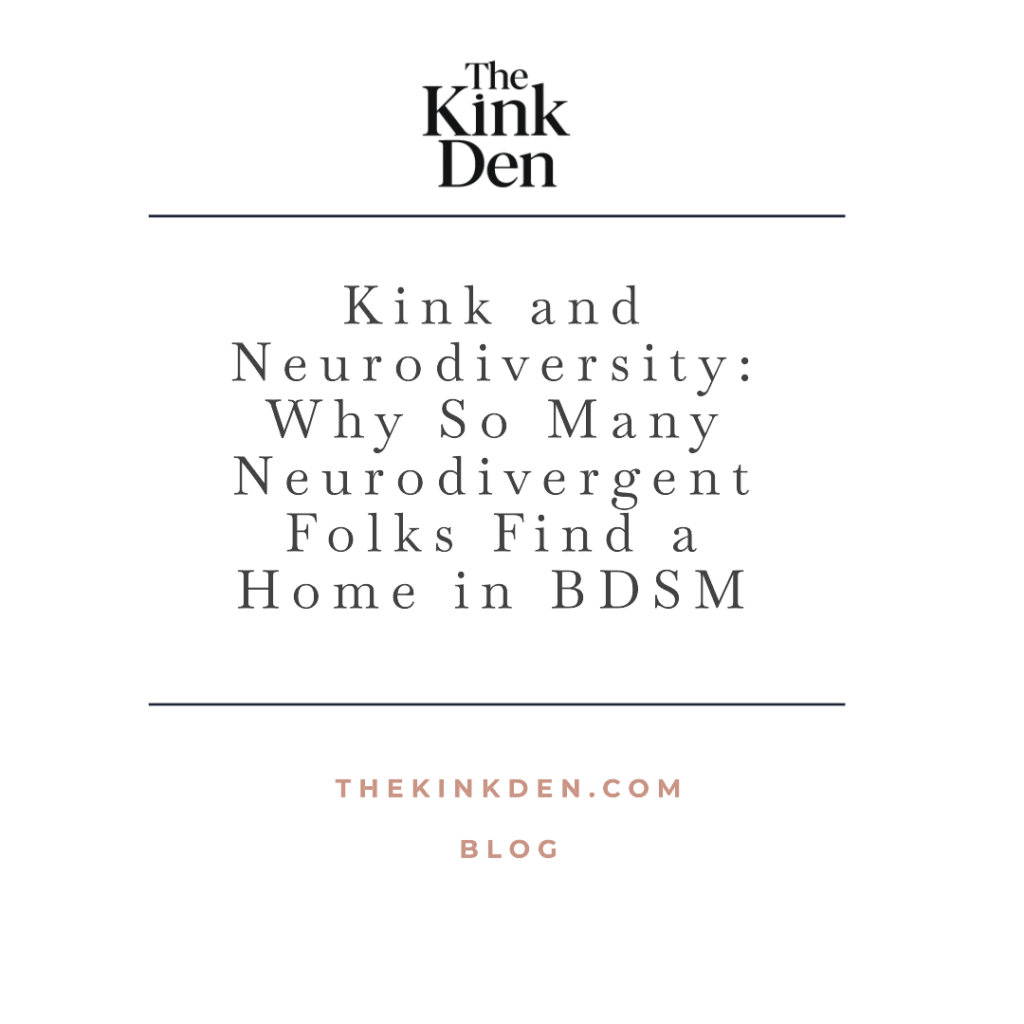Content warning: This post discusses trauma, neurodivergence, and sexual expression.
There’s a quiet truth that is increasingly being voiced across neurodivergent and kink communities alike: many neurodivergent folks feel at home in BDSM. If you’ve ever wondered why people with ADHD or autism seem drawn to kink spaces, you’re not alone. And you’re definitely not imagining it. Research, clinical observations, and personal testimonies all point to a strong overlap between kink and neurodiversity.
So why is this the case? And what does it mean for those of us navigating both neurodivergent and kinky identities?
What does neurodivergence mean?
Neurodivergence refers to brains that function differently from the neurotypical standard. This can include autism, ADHD, dyslexia, dyspraxia, Tourette’s, OCD, and other neurological variations. The term was popularised to challenge the assumption that these differences are inherently disordered or broken. Many neurodivergent people instead view their brain wiring as part of a natural spectrum of human diversity.
Living with a neurodivergent brain often means navigating sensory sensitivity, emotional regulation differences, difficulty with social norms, executive dysfunction, and unique ways of processing information. These aren’t problems to be fixed. They’re realities to be understood and accommodated. And when we look at kink through that lens, a lot starts to make sense.
Why kink and BDSM feel so accessible for neurodivergent people
Neurodivergent people often seek environments where social rules are made explicit, sensory needs are considered, and communication is direct. Mainstream sexual scripts rarely provide that. But kink spaces? That’s another story.
Let’s break down a few core reasons:
- Structure and clarity: BDSM involves negotiation, rules, and consent-based power exchange. For autistic folks who struggle with ambiguity, this can feel safe and grounding.
- Communication expectations: In kink, you’re encouraged to talk about what you want, how you feel, what you’re okay with, and what you’re not. This suits neurodivergent individuals who value or need explicit communication rather than relying on vague social cues.
- Control and predictability: Many people with anxiety, trauma, or executive function challenges find empowerment in consensual power play. Knowing what’s going to happen and being able to stop it at any time offers a level of safety mainstream intimacy often lacks.
- Sensory experience: Impact play, sensation play, bondage, and temperature play offer unique tactile experiences. For those with sensory processing differences, these can be regulating, stimulating, or deeply satisfying.
As Dr. Dulcinea Pitagora, a kink-affirming therapist, has stated: “The explicit communication and power negotiation in kink can be affirming for people with neurodivergent profiles, especially those who’ve been shamed for their needs in other relationships.”
The autism and BDSM overlap
Several studies and practitioner insights suggest that autistic individuals are overrepresented in kink communities. One reason? Autistic adults often create and seek out systems that make sense to them. Kink provides a roadmap for intimacy that is both customisable and clearly defined.
In a 2020 study published in the Journal of Positive Sexuality, researchers found that many autistic people engaged in BDSM as a form of sensory regulation and emotional connection. The participants described kink as a way to safely navigate identity, connect with others, and explore their desires with fewer social landmines.
It’s not just about play. It’s about building relationships that don’t rely on neurotypical norms. When a submissive can use a traffic light system to communicate their limits, or a dominant agrees to a detailed script of how a scene will unfold, it allows autistic individuals to feel seen and respected without the pressure to “mask.”
And masking, for many autistic people, is exhausting. Kink allows them to drop the mask, often for the first time.
ADHD, novelty, and the pursuit of sensation
People with ADHD are neurologically wired to crave stimulation and struggle with sustained attention unless they’re deeply engaged. Kink offers a level of novelty, unpredictability, and high-intensity focus that aligns with the ADHD brain.
In D/s dynamics, especially, the presence of routine combined with imaginative scenes can offer both grounding and excitement. Whether it’s sensory play, roleplay, or rough body play, many ADHD folks report that kink helps them drop into hyperfocus and feel connected in a way neurotypical interactions sometimes fail to offer.
One neurodivergent kinkster described it like this: “When I’m in a scene, I’m not scattered. I’m focused. I’m present. I can feel my body, and I’m not spinning in ten directions at once.”
Some even find kink to be a more effective mindfulness practice than meditation.
The importance of consent culture
Consent culture is a lifeline for many neurodivergent individuals. In mainstream dating or sexual culture, there’s often an unspoken script. You’re meant to just know when it’s time to kiss, touch, or escalate. For people who process social cues differently, this is overwhelming and often unsafe.
Kink, on the other hand, insists on talking it all through. You negotiate. You establish safewords. You say “no” without apology. And if something goes wrong, aftercare is there to help you process and return to baseline. That structure doesn’t just support better sex. It supports better mental health.
Neurodivergence and shame: healing through kink
Many neurodivergent adults grow up being shamed for who they are. Too sensitive. Too much. Too distracted. Too rigid. Too intense. These messages get absorbed and can manifest as sexual shame, avoidance, or difficulty trusting one’s desires.
Kink offers a path to healing. In consensual power exchange, people learn to feel safe in vulnerability. In service roles, they may find pride and dignity. In dominance, they reclaim power they never felt they had. In impact play, they may process years of emotional suppression. Kink is not therapy, but it can be profoundly therapeutic.
As Jessica Fern explores in her book Polysecure, understanding your attachment style and emotional wiring can transform not just relationships, but your sense of self. Many neurodivergent kinksters report that combining this kind of emotional insight with kink practices gave them permission to stop performing, stop masking, and start belonging.
Community and belonging
There’s also the simple but vital fact that kink spaces tend to be more accepting of difference. From body positivity to gender fluidity to unconventional expressions of desire, kink communities often prioritise radical acceptance and active inclusion. For neurodivergent people, this can be life-changing.
Being able to stim, wear headphones, ask for a script, or say “I need this explained literally” without shame creates the kind of community many have never known. And it allows them to show up as their whole self – not just the polished, neurotypical-passing version of themselves the world often demands.
Reading, resources, and exploration
If you’re curious to dive deeper into this intersection, these resources are an excellent place to start:
- Polysecure by Jessica Fern – a deep dive into attachment styles, emotional healing, and secure relating for neurodivergent and polyamorous folks
- Playing Well with Others by Lee Harrington – a welcoming guide for entering the kink scene
- Kink Health – inclusive kink education with a focus on trauma, neurodivergence, and healing
Final thoughts: you’re not broken, you’re wired differently
If you’re neurodivergent and drawn to kink, you’re not weird or damaged. You’re navigating a world that often doesn’t accommodate the way your brain works. And in kink, you may have found not only an outlet but a language. A language for touch, power, trust, healing, and joy. A language that doesn’t demand you be anything other than yourself.
So explore with curiosity. Set your boundaries. Speak your truth. And know that you’re not alone.
If you’d like to learn more about consent, scenes, and how to navigate BDSM safely, check out our free BDSM Beginner Guide when you subscribe to our newsletter. It’s full of tools, consent tips, and scene-starter ideas designed for curious minds just like yours.
You are not too much. You are not too sensitive. You are not alone.




